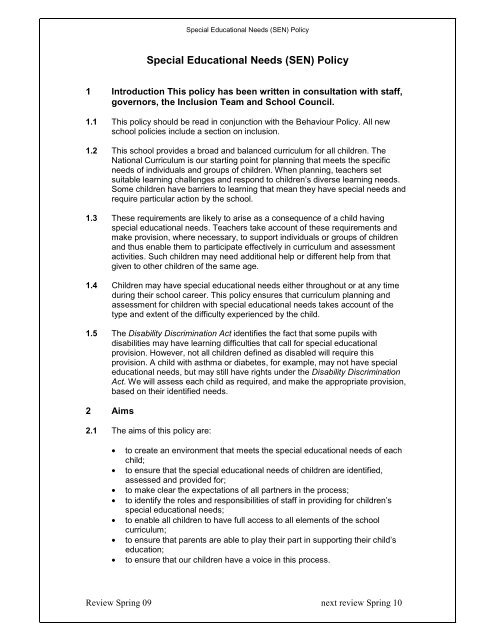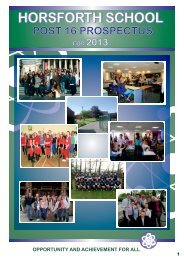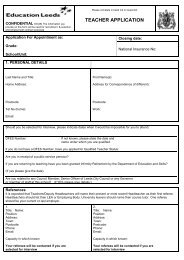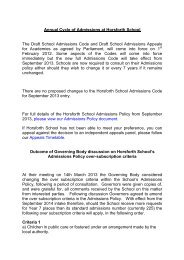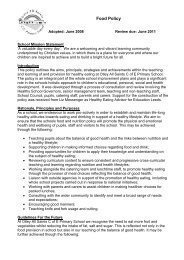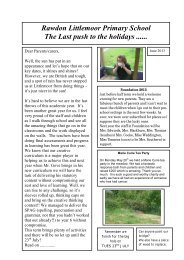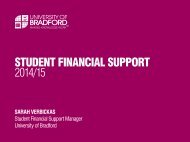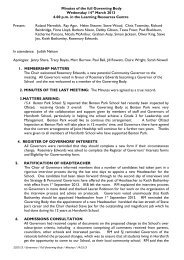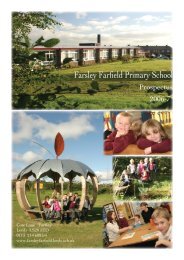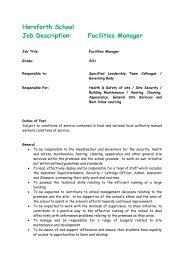Special Educational Needs (SEN) Policy - Leeds Learning Network
Special Educational Needs (SEN) Policy - Leeds Learning Network
Special Educational Needs (SEN) Policy - Leeds Learning Network
You also want an ePaper? Increase the reach of your titles
YUMPU automatically turns print PDFs into web optimized ePapers that Google loves.
<strong>Special</strong> <strong>Educational</strong> <strong>Needs</strong> (<strong>SEN</strong>) <strong>Policy</strong><br />
<strong>Special</strong> <strong>Educational</strong> <strong>Needs</strong> (<strong>SEN</strong>) <strong>Policy</strong><br />
1 Introduction This policy has been written in consultation with staff,<br />
governors, the Inclusion Team and School Council.<br />
1.1 This policy should be read in conjunction with the Behaviour <strong>Policy</strong>. All new<br />
school policies include a section on inclusion.<br />
1.2 This school provides a broad and balanced curriculum for all children. The<br />
National Curriculum is our starting point for planning that meets the specific<br />
needs of individuals and groups of children. When planning, teachers set<br />
suitable learning challenges and respond to children’s diverse learning needs.<br />
Some children have barriers to learning that mean they have special needs and<br />
require particular action by the school.<br />
1.3 These requirements are likely to arise as a consequence of a child having<br />
special educational needs. Teachers take account of these requirements and<br />
make provision, where necessary, to support individuals or groups of children<br />
and thus enable them to participate effectively in curriculum and assessment<br />
activities. Such children may need additional help or different help from that<br />
given to other children of the same age.<br />
1.4 Children may have special educational needs either throughout or at any time<br />
during their school career. This policy ensures that curriculum planning and<br />
assessment for children with special educational needs takes account of the<br />
type and extent of the difficulty experienced by the child.<br />
1.5 The Disability Discrimination Act identifies the fact that some pupils with<br />
disabilities may have learning difficulties that call for special educational<br />
provision. However, not all children defined as disabled will require this<br />
provision. A child with asthma or diabetes, for example, may not have special<br />
educational needs, but may still have rights under the Disability Discrimination<br />
Act. We will assess each child as required, and make the appropriate provision,<br />
based on their identified needs.<br />
2 Aims<br />
2.1 The aims of this policy are:<br />
• to create an environment that meets the special educational needs of each<br />
child;<br />
• to ensure that the special educational needs of children are identified,<br />
assessed and provided for;<br />
• to make clear the expectations of all partners in the process;<br />
• to identify the roles and responsibilities of staff in providing for children’s<br />
special educational needs;<br />
• to enable all children to have full access to all elements of the school<br />
curriculum;<br />
• to ensure that parents are able to play their part in supporting their child’s<br />
education;<br />
• to ensure that our children have a voice in this process.<br />
Review Spring 09 next review Spring 10
<strong>Special</strong> <strong>Educational</strong> <strong>Needs</strong> (<strong>SEN</strong>) <strong>Policy</strong><br />
3 <strong>Educational</strong> inclusion<br />
3.1 In our school we aim to offer excellence and choice to all our children, whatever<br />
their ability or needs. We have high expectations of all our children. We aim to<br />
achieve this through the removal of barriers to learning and participation. We<br />
want all our children to feel that they are a valued part of our school community.<br />
Through appropriate curricular provision, we respect the fact that children:<br />
• have different educational and behavioural needs and aspirations;<br />
• require different strategies for learning;<br />
• acquire, assimilate and communicate information at different rates;<br />
• need a range of different teaching approaches and experiences.<br />
3.2 Teachers respond to children’s needs by:<br />
• providing support for children who need help with communication, language<br />
and literacy;<br />
• planning to develop children’s understanding through the use of all their<br />
senses and of varied experiences;<br />
• planning for children’s full participation in learning, and in physical and<br />
practical activities;<br />
• helping children to manage their behaviour and to take part in learning<br />
effectively and safely;<br />
• helping individuals to manage their emotions, particularly trauma or stress,<br />
and to take part in learning.<br />
• providing appropriate and additional resources.<br />
4 <strong>Special</strong> educational needs<br />
4.1 Children with special educational needs have learning difficulties that call for<br />
special provision to be made. All children may have special needs at some time<br />
in their lives. Children have a learning difficulty if:<br />
• they have significantly greater difficulty in learning than the majority of<br />
children of the same age;<br />
• they have a disability which prevents or hinders them from making use of the<br />
educational facilities that are provided for other children of the same age.<br />
4.2 Many of the children who join us have already been in early education. In some<br />
cases children join us with their needs already assessed. All children are<br />
assessed when they enter our school, so that we can build upon their prior<br />
learning. We use this information to provide starting points for the development<br />
of an appropriate curriculum for all our children.<br />
4.3 If our assessments show that a child may have a learning difficulty, we use a<br />
range of strategies that make full use of all available classroom and school<br />
resources. This level of support is called School Action. The child’s class<br />
teacher will offer interventions that are different from or additional to those<br />
provided as part of the school’s usual working practices. The class teacher will<br />
keep parents informed and draw upon them for additional information. The<br />
<strong>Special</strong> <strong>Educational</strong> <strong>Needs</strong> Coordinator (<strong>SEN</strong>CO Rebecca Howells Foundation<br />
Stage and KS1, Sarah Smith KS2), if not already involved, will become involved<br />
Review Spring 09 next review Spring 10
<strong>Special</strong> <strong>Educational</strong> <strong>Needs</strong> (<strong>SEN</strong>) <strong>Policy</strong><br />
if the teacher and parents feel that the child would benefit from further support.<br />
The <strong>SEN</strong>CO will then take the lead in further assessments of the child’s needs.<br />
4.4 The teacher will record, in an Individual Education Plan (IEP) or Individual<br />
Behaviour Plan (IBP), the strategies used to support the child. The IEP/ IBP will<br />
show the short-term target set for the child, and the teaching strategies to be<br />
used. It will also indicate the planned outcomes and the date for the plan to be<br />
reviewed. Targets should be reviewed half termly. Review meetings with staff,<br />
parents and child ( where appropriate) will take place at least on a bi- annual<br />
basis.<br />
4.5 IEP’s can be for either an individual or small group of children, but should be<br />
reviewed on an individual basis.<br />
4.6 If the IEP/ IBP review identifies that support is needed from outside services, we<br />
will consult parents prior to any support being actioned. In most cases, children<br />
will be seen in school by external support services. This may lead to additional<br />
strategies or strategies that are different from those used in School Action. This<br />
enhanced level of support is called School Action Plus. External support<br />
services will provide information for the child’s new IEP/ IBP. The new strategies<br />
in the IEP/ IBP will, wherever possible, be implemented within the child’s normal<br />
classroom setting. It is the responsibility of the class teacher to ensure these<br />
plans are followed.<br />
4.6 If the child continues to demonstrate significant cause for concern, a request for<br />
statutory assessment may be made to the LEA. A range of written evidence<br />
about the child will support the request.<br />
4.7 In our school the <strong>SEN</strong>CO:<br />
• manages the day-to-day operation of the policy;<br />
• co-ordinates the provision for and manages the responses to children’s<br />
special needs;<br />
• supports and advises colleagues;<br />
• oversees the records of all children with special educational needs;<br />
• acts as the link with parents;<br />
• acts as the link with external agencies and other support agencies;<br />
• monitors and evaluates the special educational needs provision, and reports<br />
to the governing body;<br />
• manages a range of resources, both human and material, to enable<br />
appropriate provision to be made for children with special educational<br />
needs;<br />
• contributes to the professional development of all staff.<br />
5 The role of the governing body<br />
5.1 The governing body has due regard to the Code of Practice when carrying out<br />
its duties toward all pupils with special educational needs.<br />
5.2 The governing body does its best to secure the necessary provision for any<br />
pupil identified as having special educational needs. The governors ensure that<br />
all teachers are aware of the importance of providing for these children. They<br />
consult the LEA and other schools, when appropriate.The governing body<br />
Review Spring 09 next review Spring 10
<strong>Special</strong> <strong>Educational</strong> <strong>Needs</strong> (<strong>SEN</strong>) <strong>Policy</strong><br />
ensures that parents are notified of any decision by the school that <strong>SEN</strong><br />
provision is to be made for their child.<br />
5.3 The governing body has identified governors to have specific oversight of the<br />
school’s provision for pupils with special educational needs. The 'responsible<br />
people' in this school are Viki Arnold, Karen Meek and Janice Coleman.<br />
5.4 The <strong>SEN</strong> governors supported by the headteacher ensures that all governors<br />
are aware of the school’s <strong>SEN</strong> provision, including the deployment of funding,<br />
equipment and personnel.<br />
6 Allocation of resources<br />
6.1 The <strong>SEN</strong>CO is responsible for the operational management of the specified and<br />
agreed resourcing for special needs provision within the school, including the<br />
provision for children with Funding for Inclusion and statements of special<br />
educational needs.<br />
6.2 The headteacher informs the governing body of how the funding allocated to<br />
support special educational needs has been employed.<br />
6.3 The headteacher and the <strong>SEN</strong>CO meet annually to agree on how to use funds<br />
directly related to statements and funding for inclusion. The <strong>SEN</strong>CO draws up<br />
the resources bid when the school is planning for the next school improvement<br />
plan.<br />
7 Assessment<br />
7.1 Early identification is vital. The class teacher informs the parents at the earliest<br />
opportunity to alert them to concerns and enlist their active help and<br />
participation.<br />
7.2 The class teacher, intervention manager and the <strong>SEN</strong>CO assess and monitor<br />
the children’s progress in line with existing school practices. This is an ongoing<br />
process.<br />
7.3 The <strong>SEN</strong>CO works closely with parents and teachers to plan an appropriate<br />
programme of support.<br />
7.4 The assessment of children reflects as far as possible their participation in the<br />
whole curriculum of the school. The class teacher and the <strong>SEN</strong>CO can break<br />
down the assessment into smaller steps in order to aid progress and provide<br />
detailed and accurate indicators.<br />
7.5 The LEA seeks a range of advice before making a formal statement. The needs<br />
of the child are considered to be paramount in this.<br />
8 Access to the curriculum<br />
8.1 All children have an entitlement to a broad and balanced curriculum, which is<br />
differentiated to enable them to:<br />
• understand the relevance and purpose of learning activities;<br />
• experience levels of understanding and rates of progress that bring feelings<br />
of success and achievement.<br />
Review Spring 09 next review Spring 10
<strong>Special</strong> <strong>Educational</strong> <strong>Needs</strong> (<strong>SEN</strong>) <strong>Policy</strong><br />
8.2 Teachers use a range of strategies to meet children’s special educational<br />
needs. Lessons have clear learning objectives; we differentiate work<br />
appropriately, and we use assessment to inform the next stage of learning.<br />
8.3 Individual Education Plans, which employ a small-steps approach, feature<br />
significantly in the provision that we make in the school. By breaking down the<br />
existing levels of attainment into finely graded steps and targets, we ensure that<br />
children experience success. All children at both School Action and School<br />
Action Plus levels have an IEP or IBP.<br />
8.4 We support children in a manner that acknowledges their entitlement to share<br />
the same learning experiences that their peers enjoy. Wherever possible, we do<br />
not withdraw children from the classroom. There are times, though, when to<br />
maximise learning, we ask the children to work in small groups, or in a one-toone<br />
situation outside the classroom.<br />
9 Partnership with parents<br />
9.1 The school works closely with parents in the support of those children with<br />
special educational needs. We encourage an active partnership through an<br />
ongoing dialogue with parents. The home-school agreement is central to this.<br />
Parents have much to contribute to our support for children with special<br />
educational needs.<br />
9.2 The school prospectus contains details of our policy for special educational<br />
needs, and the arrangements made for these children in our school. A named<br />
governor takes a particular interest in special needs and is always willing to talk<br />
to parents.( Viki Arnold, Karen Meek and Janice Coleman)<br />
9.3 We have regular meetings each term to share the progress of special needs<br />
children with their parents. We inform the parents of any outside intervention,<br />
and we share the process of decision-making by providing clear information<br />
relating to the education of children with special educational needs.<br />
10 Pupil participation<br />
10.1 In our school we encourage children to take responsibility and to make<br />
decisions. This is part of the culture of our school and relates to children of all<br />
ages. SEAL work across school recognises the importance of children<br />
developing social as well as educational skills.<br />
10.2 Children are involved at an appropriate level in setting targets in their IEP/ IBP<br />
and in the termly review meetings. Children are encouraged to make<br />
judgements about their own performance against their targets. We recognise<br />
success here as we do in any other aspect of school life.<br />
11 Monitoring and review<br />
11.1 The <strong>SEN</strong>CO monitors the movement of children within the <strong>SEN</strong> system in<br />
school. The <strong>SEN</strong>CO provides staff and governors with regular summaries of the<br />
impact of the policy on the practice of the school.<br />
11.2 The <strong>SEN</strong>CO is involved in supporting teachers involved in drawing up Individual<br />
Education Plans for children. The <strong>SEN</strong>CO and the headteacher hold regular<br />
Review Spring 09 next review Spring 10
<strong>Special</strong> <strong>Educational</strong> <strong>Needs</strong> (<strong>SEN</strong>) <strong>Policy</strong><br />
meetings to review the work of the school in this area. The <strong>SEN</strong>CO and the<br />
named governor with responsibility for special needs also hold termly meetings<br />
as an agenda item on the Inclusion Team.<br />
11.3 The governing body reviews this policy annually and considers any<br />
amendments in the light of the annual review findings. The <strong>SEN</strong>CO reports the<br />
outcome of the review to the full governing body as part of the Head teacher’s<br />
report.<br />
Signed:<br />
Date:<br />
Review Spring 09 next review Spring 10


